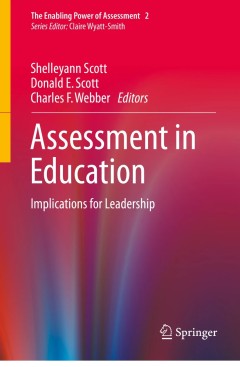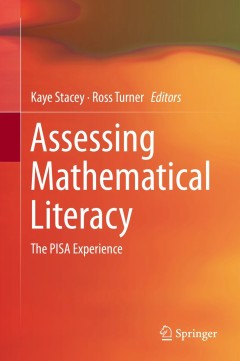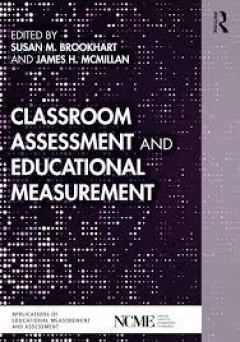Filter by

Assessment in Music Education: from Policy to Practice
The contributions to this volume aim to stimulate discussion about the role of assessment in the learning experiences of students in music and other creative and performing arts settings. The articles offer insights on how assessment can be employed in the learning setting to enhance outcomes for students both during their studies at higher education institutions and after graduation. An int…
- Edition
- Ed. 1
- ISBN/ISSN
- 978-3-319-10274-0
- Collation
- XV, 296
- Series Title
- Landscapes: the Arts, Aesthetics, and Education
- Call Number
- 371.26 ASS a

Assessment in Mathematics Education: Large-Scale Assessment and Classroom Ass…
This book provides an overview of current research on a variety of topics related to both large-scale and classroom assessment. First, the purposes, traditions and principles of assessment are considered, with particular attention to those common to all levels of assessment and those more connected with either classroom or large-scale assessment. Assessment design based on sound assessment prin…
- Edition
- Ed. 1
- ISBN/ISSN
- 978-3-319-32394-7
- Collation
- IX, 38
- Series Title
- ICME-13 Topical Surveys
- Call Number
- 371.26 ASS a

Assessment in Education: Implications for Leadership
This book provides key insights into how educational leaders can successfully navigate the turbulence of political debate surrounding leading student assessment and professionalised practice. Given the highly politicised nature of assessment, it addresses leaders and aspiring leaders who are open to being challenged, willing to explore controversy, and capable of engaging in informed critical d…
- Edition
- Ed. 1
- ISBN/ISSN
- 978-3-319-23398-7
- Collation
- XIV, 314
- Series Title
- The Enabling Power of Assessment
- Call Number
- 371.26 ASS a

Assessment for Learning: Meeting the Challenge of Implementation
This book provides new perspectives on Assessment for Learning (AfL), on the challenges encountered in its implementation, and on the diverse ways of meeting these challenges. It brings together contributions from authors working in a wide range of educational contexts: Australia, Canada, England, Germany, New Zealand, Norway, Israel, Philippines, Scotland, Spain, Sweden, Switzerland, the Unite…
- Edition
- Ed. 1
- ISBN/ISSN
- 978-3-319-39211-0
- Collation
- XXIV, 363
- Series Title
- The Enabling Power of Assessment
- Call Number
- 371.26 ASS a

Assessment for Learning Within and Beyond the Classroom: Taylor’s 8th Teach…
These conference proceedings focus on “Assessment for Learning: Within and Beyond the Classroom” in recognition of the power of assessment for learning as a way of boosting student performance. They explore the breadth, depth and quality of the best models and practices, strategies, lessons learnt and discuss cases of successful implementation of assessment within the classroom and beyond, …
- Edition
- Ed. 1
- ISBN/ISSN
- 978-981-10-0908-2
- Collation
- X, 446
- Series Title
- -
- Call Number
- 371.26 ASS a

Assessment and Teaching of 21st Century Skills: Methods and Approach
This second volume of papers from the ATC21STM project deals with the development of an assessment and teaching system of 21st century skills. Readers are guided through a detailed description of the methods used in this process. The first volume was published by Springer in 2012 (Griffin, P., McGaw, B. & Care, E., Eds., Assessment and Teaching of 21st Century Skills, Dordrecht: Springer). The …
- Edition
- Ed. 1
- ISBN/ISSN
- 978-94-017-9395-7
- Collation
- XII, 310
- Series Title
- Educational Assessment in an Information Age
- Call Number
- 371.26 ASS a

Assessing Mathematical Literacy: The PISA Experience
This book describes the design, development, delivery and impact of the mathematics assessment for the OECD Programme for International Student Assessment (PISA). First, the origins of PISA’s concept of mathematical literacy are discussed, highlighting the underlying themes of mathematics as preparation for life after school and mathematical modelling of the real world, and clarifying PISA’…
- Edition
- Ed. 1
- ISBN/ISSN
- 978-3-319-10121-7
- Collation
- XXI, 321
- Series Title
- -
- Call Number
- 379.1 ASS a

Preparing Students for College and Careers : Theory, Measurement, and Educati…
Preparing Students for College and Careers addresses measurement and research issues related to college and career readiness. Educational reform efforts across the United States have increasingly taken aim at measuring and improving postsecondary readiness. These initiatives include developing new content standards, redesigning assessments and performance levels, legislating new developmental e…
- Edition
- -
- ISBN/ISSN
- 9781317221616
- Collation
- 204 halaman
- Series Title
- -
- Call Number
- 370 PRE

Assessing Competence in Professional Performance across Disciplines and Profe…
This book examines the challenges of cross-professional comparisons and proposes new forms of performance assessment to be used in professions education. It addresses how complex issues are learned and assessed across and within different disciplines and professions in order to move the process of “performance assessment for learning” to the next level. In order to be better equipped to cop…
- Edition
- Ed. 1
- ISBN/ISSN
- 978-3-319-30064-1
- Collation
- XXVI, 473
- Series Title
- Innovation and Change in Professional Education
- Call Number
- 374.013 ASS a

Classroom Assessment and Educational Measurement
Classroom Assessment and Educational Measurement explores the ways in which the theory and practice of both educational measurement and the assessment of student learning in classroom settings mutually inform one another. Chapters by assessment and measurement experts consider the nature of classroom assessment information, from student achievement to affective and socio-emotional attributes; h…
- Edition
- -
- ISBN/ISSN
- 9780429017612
- Collation
- -
- Series Title
- -
- Call Number
- -
 Computer Science, Information & General Works
Computer Science, Information & General Works  Philosophy & Psychology
Philosophy & Psychology  Religion
Religion  Social Sciences
Social Sciences  Language
Language  Pure Science
Pure Science  Applied Sciences
Applied Sciences  Art & Recreation
Art & Recreation  Literature
Literature  History & Geography
History & Geography